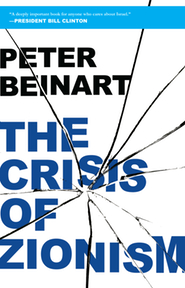
Peter Beinart, a former editor of The New Republic who now writes for the Daily Beast and teaches at the City University of New York, has just published a remarkable book, The Crisis of Zionism, that tackles one of the most contentious issues in American politics: how the United States interacts with an Israel that seems increasingly unreceptive to American advice but increasingly engaged in American politics. I put six questions to Beinart about The Crisis of Zionism and its critics, who seem curiously intent on attacking him while ignoring the actual content of his book:
1. It has seemed this year as though figures known for enthusiastically backing West Bank settlement construction, such as Sheldon Adelson and Irving Moskowitz, are putting an immense amount of money into the G.O.P.’s efforts to defeat Barack Obama. Why do you think this is so, and what do you think is the object of their attempts to influence the elections?
Adelson is to the right on a whole range of issues; I don’t know if Moskowitz’s interests are broader than Israel, but I do think both men believe Obama is bad for Israel and that Romney would be better, especially on Iran. I think they’re wrong. Obama’s policies are actually far better for Israel vis-à-vis both Iran and Palestine—and specifically vis-à-vis the possibility of a Palestinian state, because a one-state solution would be a disaster for Israel. But that’s where the Republican Party has essentially gone: to a one-state position.
2. In the past several months, Israeli leaders have floated, backpedaled on, and floated again the notion of a pre-emptive Israeli airstrike against Iran. The idea is always presented as a test of the U.S.–Israel relationship and as a seeming pretext for criticism of Obama, and with the thought that it could occur before the U.S. elections in November. Do you suspect that the elections are motivating this talk—that Netanyahu and those close to him want to use it as a wedge to break Obama’s hold on Jewish voters?
Obama’s description of the Israeli-Palestinian conflict in his 2006 book, The Audacity of Hope, is also telling. In the one paragraph Obama devotes to the conflict, his central theme is the similarity between Israelis and Palestinians. He describes talking “to Jews who’d lost parents in the Holocaust and brothers in suicide bombings” and hearing “Palestinians talk of the indignities of checkpoints and reminisce about the land they had lost.”… While such rhetoric is hardly radical, it subtly contradicts the view of major American Jewish leaders, who usually reject any equivalence between Jewish and Palestinian suffering. The American Jewish establishment generally stresses the moral dissimilarity between Israelis and Palestinians; Obama in The Audacity of Hope does the opposite.
—From The Crisis of Zionism. Reprinted by permission of Times Books, © 2012 Peter Beinart.
No, I don’t. They’re not doing this because they think they can push voters away from Obama. I don’t think the specter of an attack on Iran could do that in significant measure anyway. It’s a useful time to raise the idea partly because the political realities make it harder for Obama to restrain Netanyahu now than they might at a different time. But to be fair to Netanyahu, he has been very focused on Iran for years—it has been his number-one issue since he came to office. I disagree with his view of it and with the policies he supports, but I don’t question his sincerity, nor how deeply he cares about the issue.
3. Your book has been reviewed very negatively by figures close to the U.S. Jewish establishment—you’ve been called “naive” and “Manichean,” and your view of Israeli politics has been described as lacking subtlety. On the other hand, none of these reviewers has attempted to discuss the major themes of your book, such as the significance of West Bank settlements. Why do you think you’re being stridently attacked, while the actual topics of your book are being ignored?
I think the issue of settlements and Israel’s continued, very explicit support for their construction across the West Bank is very difficult for American Jewish organizations to deal with. On one hand, they say they support a two-state solution, but on the other they don’t want to have to publicly confront the Israeli government. You can’t square those two positions when you have an Israeli government committed to settlement growth.
The painful thing to me about the criticism is the claim that my book doesn’t show love and empathy for Israel. The whole reason I wrote the book was because of how much I admire the creation of Israel as a democratic state, how precious I believe it is, and how deeply I want it to survive as a democratic Jewish state for my children and grandchildren.
4. You quote an interview that Benzion Netanyahu, the current prime minister’s father, gave to Maariv in 2009, in which he compared Jews and Arabs to two goats and said that one “must jump into the river.” What do you think he meant by this? Do you see any evidence of this perspective in Benjamin Netanyahu’s conduct as prime minister?
Benjamin Netanyahu doesn’t trust Barack Obama, and probably never will. The reason is simple: Obama reminds Netanyahu of what Netanyahu doesn’t like about Jews. Understanding what Netanyahu doesn’t like about Jews requires understanding what Vladimir Jabotinsky didn’t like about Jews. For if Obama’s Jewish lineage runs through Arnold Jacob Wolf to Abraham Joshua Heschel, Netanyahu’s runs through his father, Benzion, to Jabotinsky, the spellbinding, romantic, brutal founder of Revisionist Zionism. What Jabotinsky didn’t like about Jews was their belief that they carried a moral message to the world.
—From The Crisis of Zionism. Reprinted by permission of Times Books, © 2012 Peter Beinart.
What I think is striking in Netanyahu’s writing is his total lack of empathy with Palestinian suffering. It’s completely absent from his writing about the conflict, even from his very long book A Durable Peace. His published work shows very little evidence that he feels—that he understands—the suffering of Palestinians and empathizes with their dignity. That’s unfortunate. While it’s important to be zealous about Israeli security, I believe it’s essential to that security to recognize the dignity of Palestinians and to maintain the possibility of their gaining the dignity that comes with statehood.
5. Tony Judt criticized Israel’s “macho victimhood” and said that the country was “no longer fully able to estimate, assess or understand the way other people think about it,” which could lead to dangerous blunders in foreign affairs. Do you think he was right?
Israel does face threats, no question about it—Israel faces very real threats. But the constant analogizing of the threats it faces to the Holocaust is very dangerous. During the Holocaust, the Jews were powerless in Europe. The difference today is that Israel is a powerful country whose political decisions can shape the nature of these threats, and can mitigate them. For instance, stopping settlement construction is a way of undermining the radical anti-Israel forces in the Arab world and of strengthening those who wish to live in peace with Israel. But describing Israelis today as the equivalent of the stateless Jews of Europe in the 1920s and 1930s blinds Israeli policy-makers—or at least this Israeli government—to the fact that a state has the power to shape its strategic environment. This government has done a poor job of shaping its strategic environment in a way that could reduce security threats.
6. You write that the “American Jewish establishment has laid a trap for itself” by abandoning a model that frames support for Israel on democratic commitments. Is this because the establishment has changed, Israel has changed, or both?

American Jewish organizations tend to say they support Israel because of its democratic values, because American Jews are basically secular, and supporting Israel on Biblical grounds is not comfortable for many of them. The problem is that supporting the Israeli government on democratic grounds conflicts with supporting religiously motivated policies that make the occupation and Israeli control over the undemocratic West Bank permanent. So the trap is that you end up having to choose between truly supporting Israeli democracy or remaining silent about Israeli policies on the West Bank.


